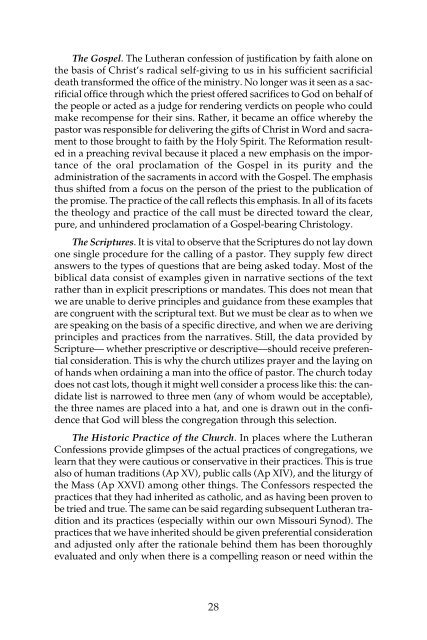45930 Divine Call CTCR final - The Lutheran Church—Missouri Synod
45930 Divine Call CTCR final - The Lutheran Church—Missouri Synod
45930 Divine Call CTCR final - The Lutheran Church—Missouri Synod
Create successful ePaper yourself
Turn your PDF publications into a flip-book with our unique Google optimized e-Paper software.
<strong>The</strong> Gospel. <strong>The</strong> <strong>Lutheran</strong> confession of justification by faith alone on<br />
the basis of Christ’s radical self-giving to us in his sufficient sacrificial<br />
death transformed the office of the ministry. No longer was it seen as a sacrificial<br />
office through which the priest offered sacrifices to God on behalf of<br />
the people or acted as a judge for rendering verdicts on people who could<br />
make recompense for their sins. Rather, it became an office whereby the<br />
pastor was responsible for delivering the gifts of Christ in Word and sacrament<br />
to those brought to faith by the Holy Spirit. <strong>The</strong> Reformation resulted<br />
in a preaching revival because it placed a new emphasis on the importance<br />
of the oral proclamation of the Gospel in its purity and the<br />
administration of the sacraments in accord with the Gospel. <strong>The</strong> emphasis<br />
thus shifted from a focus on the person of the priest to the publication of<br />
the promise. <strong>The</strong> practice of the call reflects this emphasis. In all of its facets<br />
the theology and practice of the call must be directed toward the clear,<br />
pure, and unhindered proclamation of a Gospel-bearing Christology.<br />
<strong>The</strong> Scriptures. It is vital to observe that the Scriptures do not lay down<br />
one single procedure for the calling of a pastor. <strong>The</strong>y supply few direct<br />
answers to the types of questions that are being asked today. Most of the<br />
biblical data consist of examples given in narrative sections of the text<br />
rather than in explicit prescriptions or mandates. This does not mean that<br />
we are unable to derive principles and guidance from these examples that<br />
are congruent with the scriptural text. But we must be clear as to when we<br />
are speaking on the basis of a specific directive, and when we are deriving<br />
principles and practices from the narratives. Still, the data provided by<br />
Scripture— whether prescriptive or descriptive—should receive preferential<br />
consideration. This is why the church utilizes prayer and the laying on<br />
of hands when ordaining a man into the office of pastor. <strong>The</strong> church today<br />
does not cast lots, though it might well consider a process like this: the candidate<br />
list is narrowed to three men (any of whom would be acceptable),<br />
the three names are placed into a hat, and one is drawn out in the confidence<br />
that God will bless the congregation through this selection.<br />
<strong>The</strong> Historic Practice of the Church. In places where the <strong>Lutheran</strong><br />
Confessions provide glimpses of the actual practices of congregations, we<br />
learn that they were cautious or conservative in their practices. This is true<br />
also of human traditions (Ap XV), public calls (Ap XIV), and the liturgy of<br />
the Mass (Ap XXVI) among other things. <strong>The</strong> Confessors respected the<br />
practices that they had inherited as catholic, and as having been proven to<br />
be tried and true. <strong>The</strong> same can be said regarding subsequent <strong>Lutheran</strong> tradition<br />
and its practices (especially within our own Missouri <strong>Synod</strong>). <strong>The</strong><br />
practices that we have inherited should be given preferential consideration<br />
and adjusted only after the rationale behind them has been thoroughly<br />
evaluated and only when there is a compelling reason or need within the<br />
28


